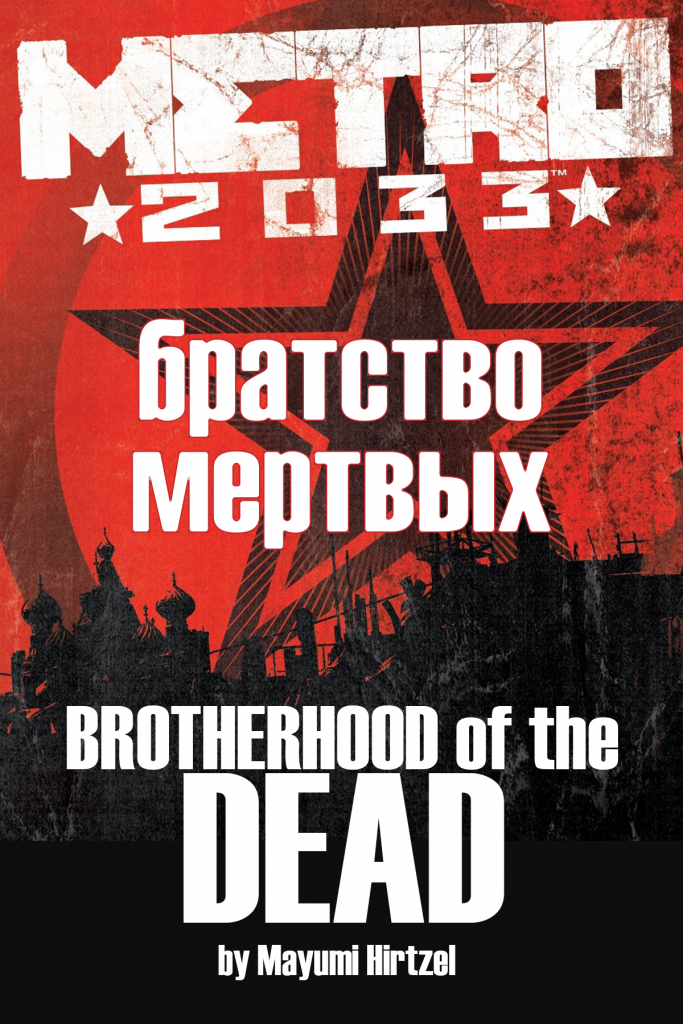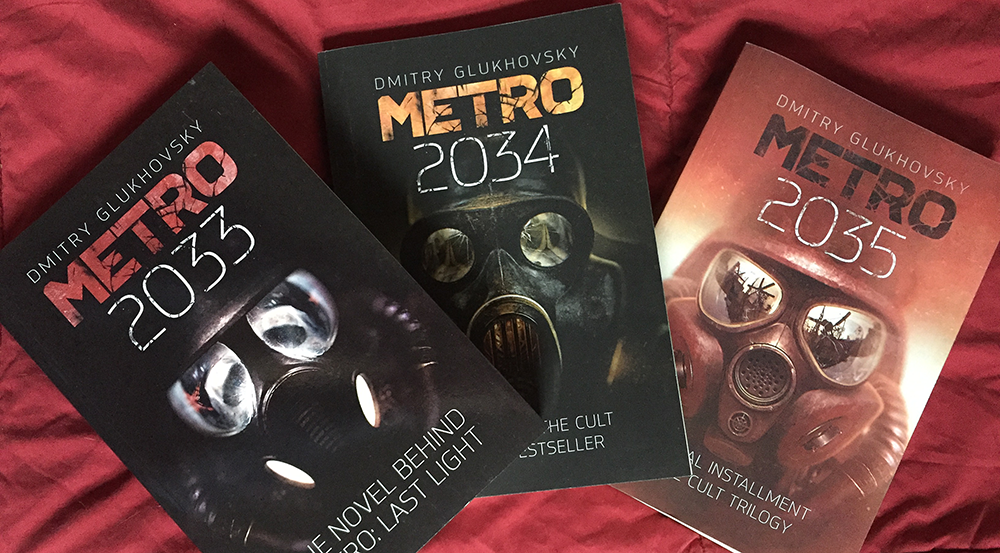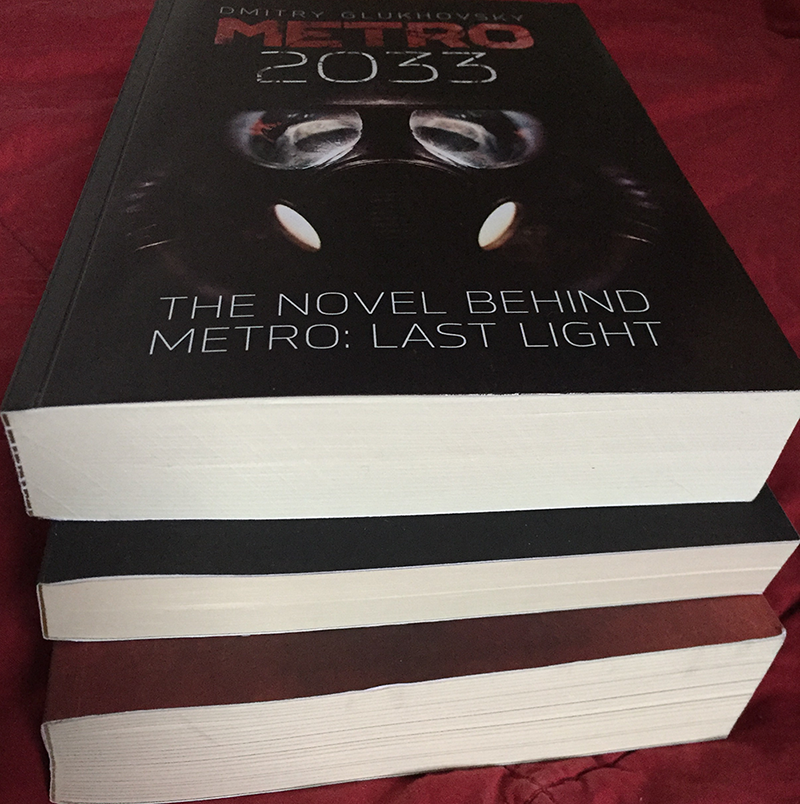by Mayumi-H | Sep 23, 2017 | Short Stories
Logline:
When Artyom escaped from the Metro tunnels under irradiated Moscow, he thought he’d left the war, the mutants, and the horrors of the Metro’s fractured societies behind. But the dead don’t give up so easily.
The story behind the story:
In early 2017, a bundle sale of “Metro 2033: Redux” rekindled my interest in the “Metro 2033” games. I vaguely remembered them being based on a larger story. So I poked around the Internet about it, and I discovered the game was based on not just one book, but three books, all written by Dmitry Glukhovsky. I ordered and devoured all three books in the space of about 5 weeks. Even after I’d finished the books, my imagination was hungry for more. I read a few fanfiction stories, but very few of them followed the books, and none of those stories took the characters where I wanted to see them go. Of course, that meant I had to put my own version to paper.
“Brotherhood of the Dead” came to me in a dream of dark tunnels and monstrous shapes, and a young couple bound to each other yet struggling to connect. I wrote it in a little less than a month, during the early summer of 2017. It’s full of a different imagery and emotion than I’ve used before, as I tried to match Glukhovsky’s original style. Still, it commandeered my brain and my keyboard until I could get the whole thing down.
Here it is, for you to click on. Or not. Very few people read this story when I posted it at Archive Of Our Own and Fanfiction.Net. Fewer still are likely to read it here. But that’s okay. I enjoyed finding my!Artyom’s voice, and doing the research around the Metro stations underneath (modern-day) Moscow, old Russian folk tales, Eurasian geography, and subterranean hydroponics. And, isn’t the joy of it what truly matters?

by Mayumi-H | May 2, 2017 | It's My Life
The story
Metro 2033 (Метро 2033) tells the story of the 40,000 survivors who escaped to the subway tunnels of the Metro beneath Moscow when nuclear conflict escalated to war between Russia and the United States in 2018. For the survivors, life went on, in a fashion. Precious ammunition counts as currency in the Metro, where people live day-to-day cultivating mushrooms, tending to pigs, and defending their home stations from mutated creatures and hostile invaders from other stations on the line. Now, a new threat has arrived: Dark Ones – neither creature nor man but some strange psychic being in-between – have started to encroach on VDNKh Station. Artyom, who was only five years old when the missiles struck, and who remembers the surface world only as a vague dream, is entrusted with a dangerous mission to destroy the Dark Ones. But that means leaving VDNKh, making his way through the warring factions of the Metro, and confronting the horrors on the surface. Along the way, he will discover a secret about the Dark Ones that could change the course of humanity forever.

My ‘Metro 2033’ collection of novels.
First published online by young Russian writer Dmitry Glukhovsky in 2002, Metro 2033 was followed by Metro 2034 in 2009, and Metro 2035 in 2015. A videogame adaptation of the first book came in 2010 from developer 4A Games, which, admittedly, was my introduction to the series, with a follow-up sequel in 2013. [If you are only familiar with the game/s, but you liked the world presented there, and if you’re dedicated enough to make it through some dense Russian fiction, I recommend the books.]
While the author was born and the books themselves take place well after the Cold War, all three include critical – at times even damning – observations on communism and fascism. These two ideologies are on display throughout the books as the primary warring factions, the Reds and the Fourth Reich. A third group, Hansa, is a free trade coalition, while the sub-stations that comprise Polis at the center of the Metro map represent a kind of intellectual oligarchy. Artyom’s interactions with all of these small nation-states (nation-stations?) form the backdrop of the Metro’s bleak survivalist landscape.
My feelings
I’ve just finished reading the third book, but I could almost go back and re-read all three of them again right away. Not because they’re great masterpieces, but because I simply felt for this story, both on the page and beyond it. I’ve seen a lot of frightening similarities to the “old Moscow” told in these books to the current world in which we live, and I hope we don’t make the same mistakes the killers and the survivors in these books do.
The first book is definitely a freshman work; Glukhovsky wrote it when he was only eighteen. The reader – especially a non-Russian-reading one – will feel the lack of a professional editor. The text is also incredibly dense, with long passages of history and exposition. But, the world and the characters of the Metro are so damn compelling, and the situation so close to the reality we’re experiencing today, that I was willing to forgive the writerly missteps, and just enjoyed being swept along Artyom’s journey through this speculative-future-Moscow and its subterranean tunnels. The second book (Metro 2034) is more polished, with fewer characters and tighter story arcs; the third (Metro 2035) even more so. There’s something about that first book, though, that really spoke to me. The characters feel like people one could actually meet in this bleak, nihilistic situation. Each man (the cast is overwhelmingly dominated by men) has his own story. Some of them, like the Marxist Revolutionaries, we glimpse only for a few pages; others, like the young Brahmin who befriends Artyom in the sprawling Library station, we grow to care about. They all have their own goals, fears, and conflicts, and create a greater world with their individual stories.

These books are not short. My edition of Metro 2033 clocks in at 460 pages; Metro 2034 runs 283 pages; Metro 2035 is a whopping 496 pages. A professional editor would, no doubt, carve out a lot of the characters and scenes, for reasons of time and space. But I’m glad they got to stay intact in the author’s vision. The books would definitely feel lesser for their loss.
Inspiration from Metro 2033
I’ve always enjoyed speculative and science fiction, though most of my long-standing favorites are farther flung in time than the world of Metro 2033. And, much of my pleasure reading over the last few years has centered firmly around detective fiction. But I had a great time reading these books; I’m glad that the recent bundle sale of the games prompted me to look up the story that inspired them, and I’m grateful to have read a young author’s journey through a world of his own making.
Glukhovsky published the first book online, on his personal website, for free. No editor, no publisher; the book distribution came three years later, after it had already been read by thousands of people in Russia and overseas. It gives me hope that there are still people – “regular” readers – who are willing to take a chance on something new, something different, something personal that doesn’t necessarily have the stamp of a big-name publishing company on it. Hope for me as a writer…and for me as a person in the real world who doesn’t want to live someplace like the Metro.
If any of you have read these books, let me know! I’m dying to talk about them with somebody. 🙂




Recent Comments
The Real Person!
Author Mayumi-H acts as a real person and passed all tests against spambots. Anti-Spam by CleanTalk.
The Real Person!
Author Mayumi-H acts as a real person and passed all tests against spambots. Anti-Spam by CleanTalk.